Auditing Theory and Practice: Examining Auditor Independence Issues
VerifiedAdded on 2020/05/03
|7
|1441
|98
Report
AI Summary
This report provides an in-depth analysis of auditing theory and practice, focusing on ethical considerations and potential threats to auditor independence. The report examines various scenarios, including the impact of familiarity threats arising from close relationships with clients, self-interest threats related to financial interests and gifts, and the implications of unpaid audit fees. The concept of materiality is also discussed, highlighting the auditor's responsibility in assessing and reporting misstatements. The report references the IESBA Code of Ethics for Professional Accountants and emphasizes the importance of adhering to ethical guidelines to maintain auditor objectivity and serve the public interest. It concludes with recommendations to ensure auditor independence and ethical conduct in all auditing practices. The report also discusses specific instances where ethical violations occurred, such as a former auditor taking on a role within the client's company, acceptance of gifts from clients, and the unauthorized use of client funds to cover audit fees. The author suggests that in all situations, the auditor should not engage in any activity that would diminish their independence.
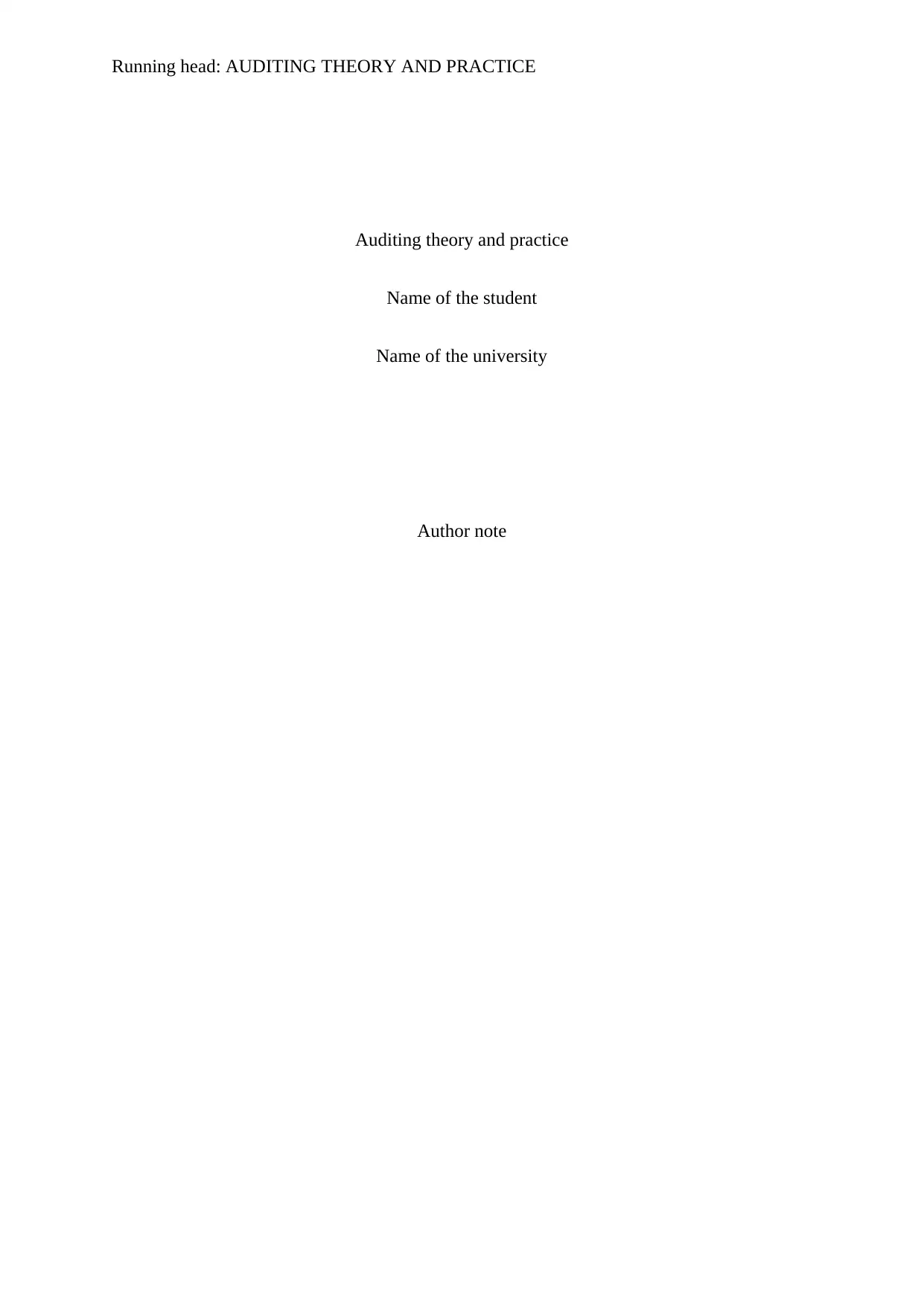
Running head: AUDITING THEORY AND PRACTICE
Auditing theory and practice
Name of the student
Name of the university
Author note
Auditing theory and practice
Name of the student
Name of the university
Author note
Paraphrase This Document
Need a fresh take? Get an instant paraphrase of this document with our AI Paraphraser
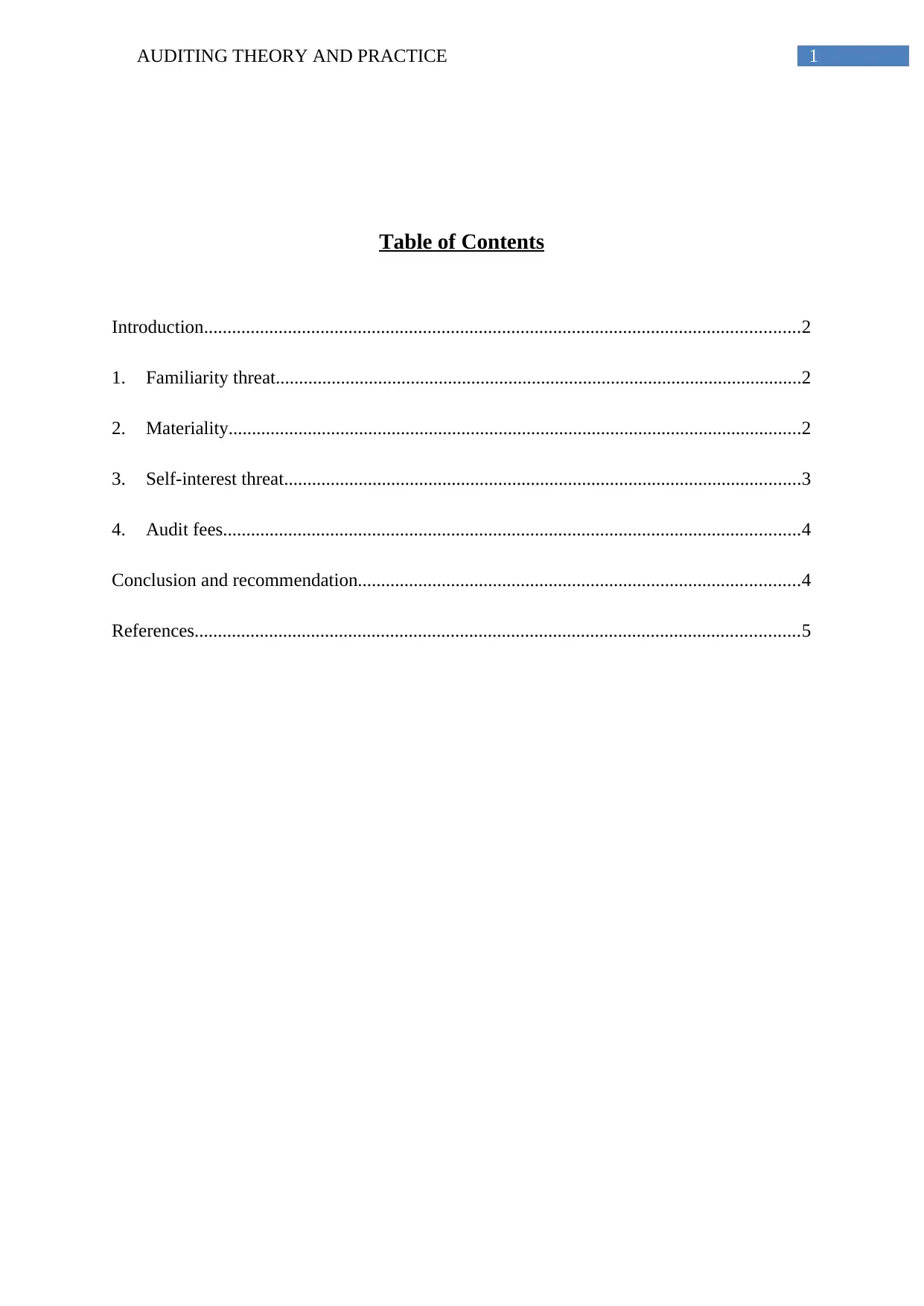
1AUDITING THEORY AND PRACTICE
Table of Contents
Introduction................................................................................................................................2
1. Familiarity threat.................................................................................................................2
2. Materiality...........................................................................................................................2
3. Self-interest threat...............................................................................................................3
4. Audit fees............................................................................................................................4
Conclusion and recommendation...............................................................................................4
References..................................................................................................................................5
Table of Contents
Introduction................................................................................................................................2
1. Familiarity threat.................................................................................................................2
2. Materiality...........................................................................................................................2
3. Self-interest threat...............................................................................................................3
4. Audit fees............................................................................................................................4
Conclusion and recommendation...............................................................................................4
References..................................................................................................................................5
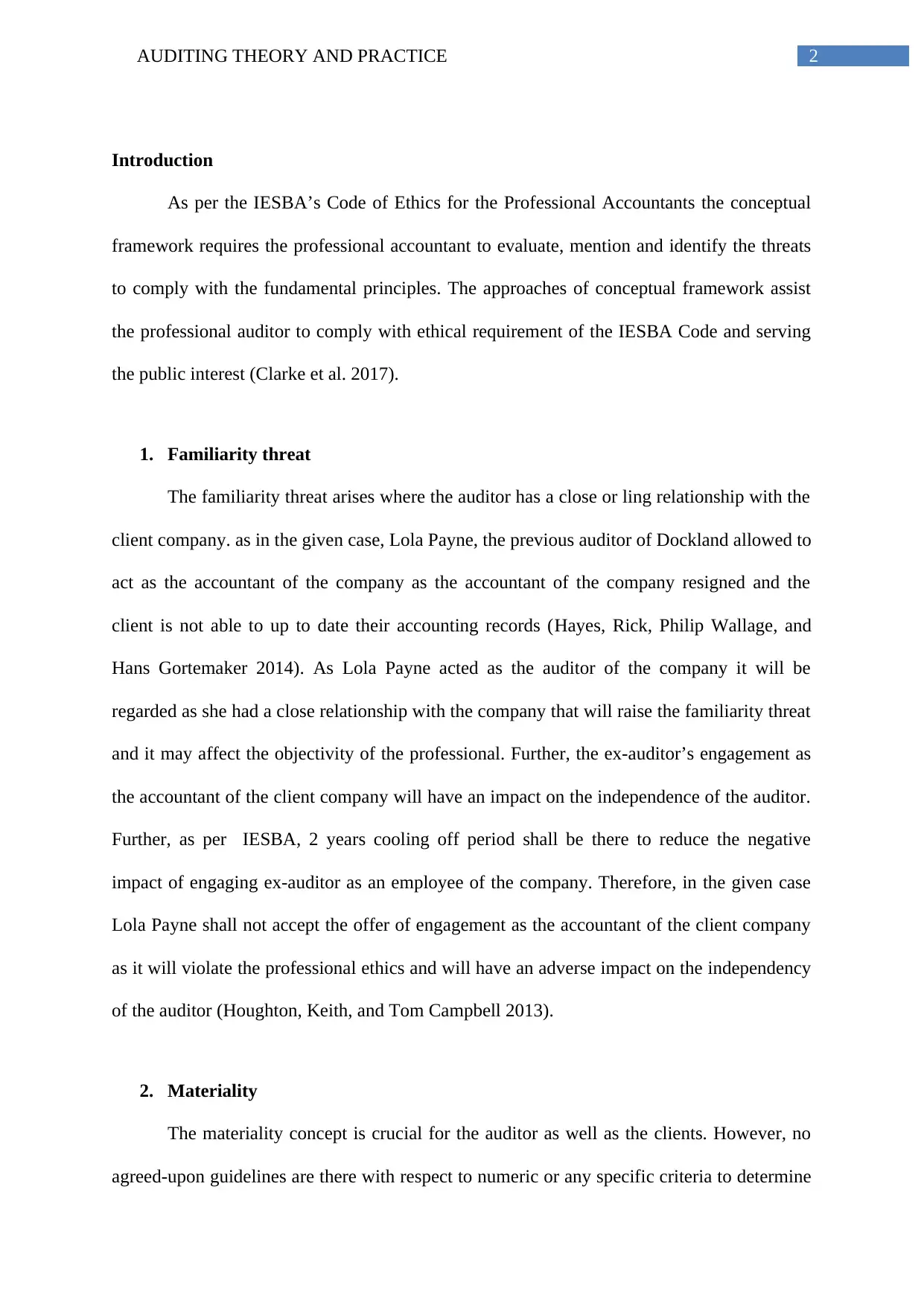
2AUDITING THEORY AND PRACTICE
Introduction
As per the IESBA’s Code of Ethics for the Professional Accountants the conceptual
framework requires the professional accountant to evaluate, mention and identify the threats
to comply with the fundamental principles. The approaches of conceptual framework assist
the professional auditor to comply with ethical requirement of the IESBA Code and serving
the public interest (Clarke et al. 2017).
1. Familiarity threat
The familiarity threat arises where the auditor has a close or ling relationship with the
client company. as in the given case, Lola Payne, the previous auditor of Dockland allowed to
act as the accountant of the company as the accountant of the company resigned and the
client is not able to up to date their accounting records (Hayes, Rick, Philip Wallage, and
Hans Gortemaker 2014). As Lola Payne acted as the auditor of the company it will be
regarded as she had a close relationship with the company that will raise the familiarity threat
and it may affect the objectivity of the professional. Further, the ex-auditor’s engagement as
the accountant of the client company will have an impact on the independence of the auditor.
Further, as per IESBA, 2 years cooling off period shall be there to reduce the negative
impact of engaging ex-auditor as an employee of the company. Therefore, in the given case
Lola Payne shall not accept the offer of engagement as the accountant of the client company
as it will violate the professional ethics and will have an adverse impact on the independency
of the auditor (Houghton, Keith, and Tom Campbell 2013).
2. Materiality
The materiality concept is crucial for the auditor as well as the clients. However, no
agreed-upon guidelines are there with respect to numeric or any specific criteria to determine
Introduction
As per the IESBA’s Code of Ethics for the Professional Accountants the conceptual
framework requires the professional accountant to evaluate, mention and identify the threats
to comply with the fundamental principles. The approaches of conceptual framework assist
the professional auditor to comply with ethical requirement of the IESBA Code and serving
the public interest (Clarke et al. 2017).
1. Familiarity threat
The familiarity threat arises where the auditor has a close or ling relationship with the
client company. as in the given case, Lola Payne, the previous auditor of Dockland allowed to
act as the accountant of the company as the accountant of the company resigned and the
client is not able to up to date their accounting records (Hayes, Rick, Philip Wallage, and
Hans Gortemaker 2014). As Lola Payne acted as the auditor of the company it will be
regarded as she had a close relationship with the company that will raise the familiarity threat
and it may affect the objectivity of the professional. Further, the ex-auditor’s engagement as
the accountant of the client company will have an impact on the independence of the auditor.
Further, as per IESBA, 2 years cooling off period shall be there to reduce the negative
impact of engaging ex-auditor as an employee of the company. Therefore, in the given case
Lola Payne shall not accept the offer of engagement as the accountant of the client company
as it will violate the professional ethics and will have an adverse impact on the independency
of the auditor (Houghton, Keith, and Tom Campbell 2013).
2. Materiality
The materiality concept is crucial for the auditor as well as the clients. However, no
agreed-upon guidelines are there with respect to numeric or any specific criteria to determine
⊘ This is a preview!⊘
Do you want full access?
Subscribe today to unlock all pages.

Trusted by 1+ million students worldwide
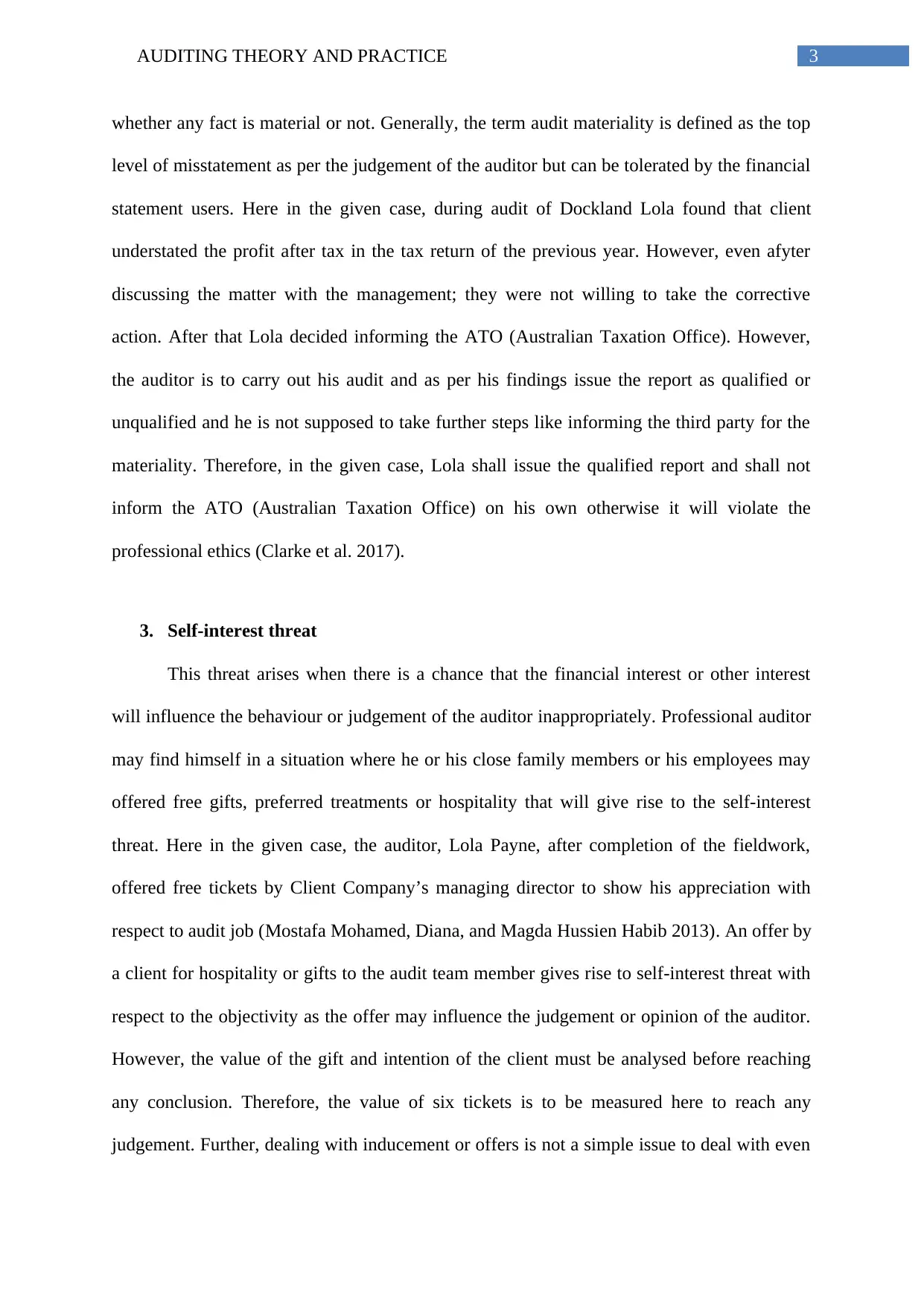
3AUDITING THEORY AND PRACTICE
whether any fact is material or not. Generally, the term audit materiality is defined as the top
level of misstatement as per the judgement of the auditor but can be tolerated by the financial
statement users. Here in the given case, during audit of Dockland Lola found that client
understated the profit after tax in the tax return of the previous year. However, even afyter
discussing the matter with the management; they were not willing to take the corrective
action. After that Lola decided informing the ATO (Australian Taxation Office). However,
the auditor is to carry out his audit and as per his findings issue the report as qualified or
unqualified and he is not supposed to take further steps like informing the third party for the
materiality. Therefore, in the given case, Lola shall issue the qualified report and shall not
inform the ATO (Australian Taxation Office) on his own otherwise it will violate the
professional ethics (Clarke et al. 2017).
3. Self-interest threat
This threat arises when there is a chance that the financial interest or other interest
will influence the behaviour or judgement of the auditor inappropriately. Professional auditor
may find himself in a situation where he or his close family members or his employees may
offered free gifts, preferred treatments or hospitality that will give rise to the self-interest
threat. Here in the given case, the auditor, Lola Payne, after completion of the fieldwork,
offered free tickets by Client Company’s managing director to show his appreciation with
respect to audit job (Mostafa Mohamed, Diana, and Magda Hussien Habib 2013). An offer by
a client for hospitality or gifts to the audit team member gives rise to self-interest threat with
respect to the objectivity as the offer may influence the judgement or opinion of the auditor.
However, the value of the gift and intention of the client must be analysed before reaching
any conclusion. Therefore, the value of six tickets is to be measured here to reach any
judgement. Further, dealing with inducement or offers is not a simple issue to deal with even
whether any fact is material or not. Generally, the term audit materiality is defined as the top
level of misstatement as per the judgement of the auditor but can be tolerated by the financial
statement users. Here in the given case, during audit of Dockland Lola found that client
understated the profit after tax in the tax return of the previous year. However, even afyter
discussing the matter with the management; they were not willing to take the corrective
action. After that Lola decided informing the ATO (Australian Taxation Office). However,
the auditor is to carry out his audit and as per his findings issue the report as qualified or
unqualified and he is not supposed to take further steps like informing the third party for the
materiality. Therefore, in the given case, Lola shall issue the qualified report and shall not
inform the ATO (Australian Taxation Office) on his own otherwise it will violate the
professional ethics (Clarke et al. 2017).
3. Self-interest threat
This threat arises when there is a chance that the financial interest or other interest
will influence the behaviour or judgement of the auditor inappropriately. Professional auditor
may find himself in a situation where he or his close family members or his employees may
offered free gifts, preferred treatments or hospitality that will give rise to the self-interest
threat. Here in the given case, the auditor, Lola Payne, after completion of the fieldwork,
offered free tickets by Client Company’s managing director to show his appreciation with
respect to audit job (Mostafa Mohamed, Diana, and Magda Hussien Habib 2013). An offer by
a client for hospitality or gifts to the audit team member gives rise to self-interest threat with
respect to the objectivity as the offer may influence the judgement or opinion of the auditor.
However, the value of the gift and intention of the client must be analysed before reaching
any conclusion. Therefore, the value of six tickets is to be measured here to reach any
judgement. Further, dealing with inducement or offers is not a simple issue to deal with even
Paraphrase This Document
Need a fresh take? Get an instant paraphrase of this document with our AI Paraphraser
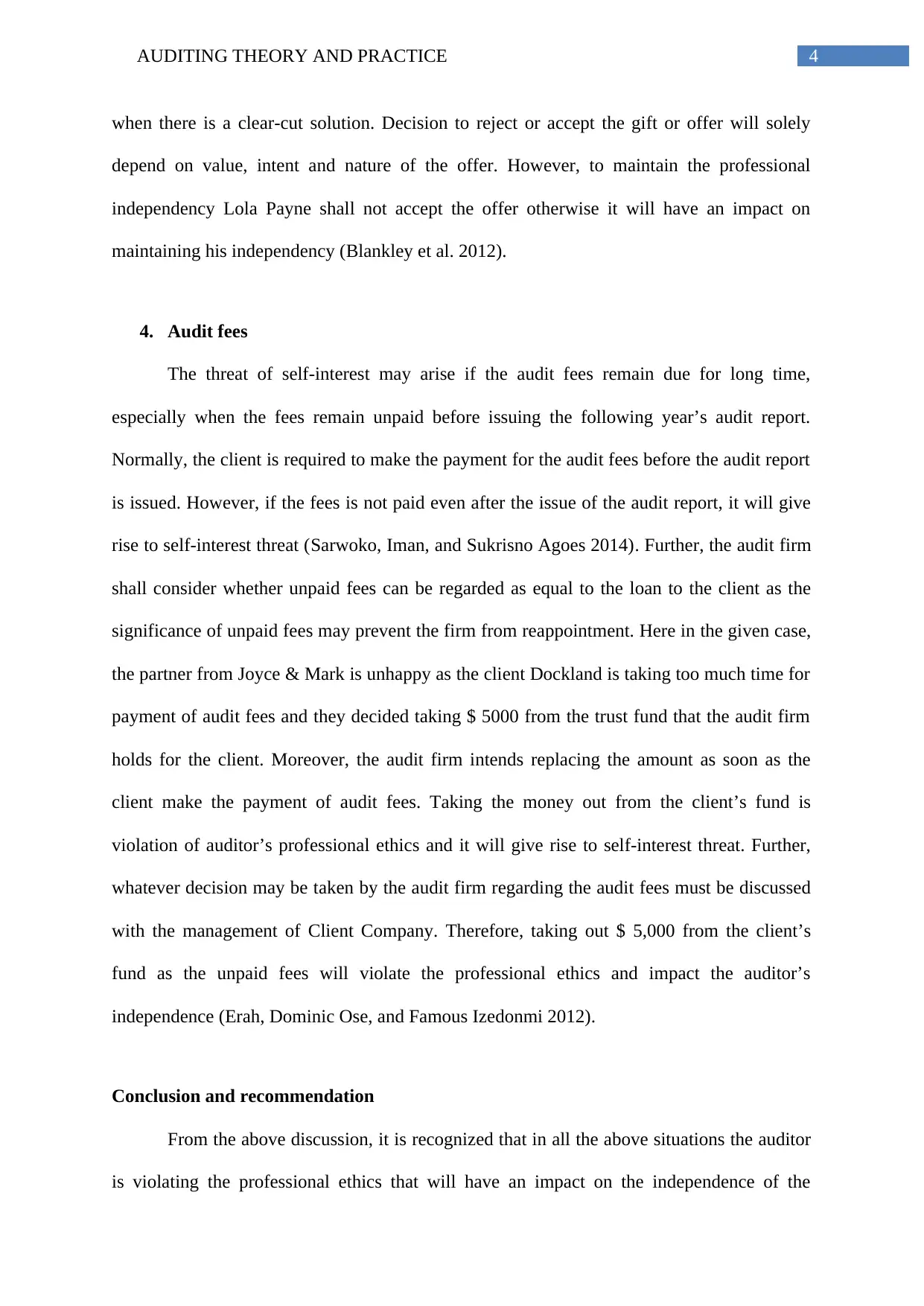
4AUDITING THEORY AND PRACTICE
when there is a clear-cut solution. Decision to reject or accept the gift or offer will solely
depend on value, intent and nature of the offer. However, to maintain the professional
independency Lola Payne shall not accept the offer otherwise it will have an impact on
maintaining his independency (Blankley et al. 2012).
4. Audit fees
The threat of self-interest may arise if the audit fees remain due for long time,
especially when the fees remain unpaid before issuing the following year’s audit report.
Normally, the client is required to make the payment for the audit fees before the audit report
is issued. However, if the fees is not paid even after the issue of the audit report, it will give
rise to self-interest threat (Sarwoko, Iman, and Sukrisno Agoes 2014). Further, the audit firm
shall consider whether unpaid fees can be regarded as equal to the loan to the client as the
significance of unpaid fees may prevent the firm from reappointment. Here in the given case,
the partner from Joyce & Mark is unhappy as the client Dockland is taking too much time for
payment of audit fees and they decided taking $ 5000 from the trust fund that the audit firm
holds for the client. Moreover, the audit firm intends replacing the amount as soon as the
client make the payment of audit fees. Taking the money out from the client’s fund is
violation of auditor’s professional ethics and it will give rise to self-interest threat. Further,
whatever decision may be taken by the audit firm regarding the audit fees must be discussed
with the management of Client Company. Therefore, taking out $ 5,000 from the client’s
fund as the unpaid fees will violate the professional ethics and impact the auditor’s
independence (Erah, Dominic Ose, and Famous Izedonmi 2012).
Conclusion and recommendation
From the above discussion, it is recognized that in all the above situations the auditor
is violating the professional ethics that will have an impact on the independence of the
when there is a clear-cut solution. Decision to reject or accept the gift or offer will solely
depend on value, intent and nature of the offer. However, to maintain the professional
independency Lola Payne shall not accept the offer otherwise it will have an impact on
maintaining his independency (Blankley et al. 2012).
4. Audit fees
The threat of self-interest may arise if the audit fees remain due for long time,
especially when the fees remain unpaid before issuing the following year’s audit report.
Normally, the client is required to make the payment for the audit fees before the audit report
is issued. However, if the fees is not paid even after the issue of the audit report, it will give
rise to self-interest threat (Sarwoko, Iman, and Sukrisno Agoes 2014). Further, the audit firm
shall consider whether unpaid fees can be regarded as equal to the loan to the client as the
significance of unpaid fees may prevent the firm from reappointment. Here in the given case,
the partner from Joyce & Mark is unhappy as the client Dockland is taking too much time for
payment of audit fees and they decided taking $ 5000 from the trust fund that the audit firm
holds for the client. Moreover, the audit firm intends replacing the amount as soon as the
client make the payment of audit fees. Taking the money out from the client’s fund is
violation of auditor’s professional ethics and it will give rise to self-interest threat. Further,
whatever decision may be taken by the audit firm regarding the audit fees must be discussed
with the management of Client Company. Therefore, taking out $ 5,000 from the client’s
fund as the unpaid fees will violate the professional ethics and impact the auditor’s
independence (Erah, Dominic Ose, and Famous Izedonmi 2012).
Conclusion and recommendation
From the above discussion, it is recognized that in all the above situations the auditor
is violating the professional ethics that will have an impact on the independence of the
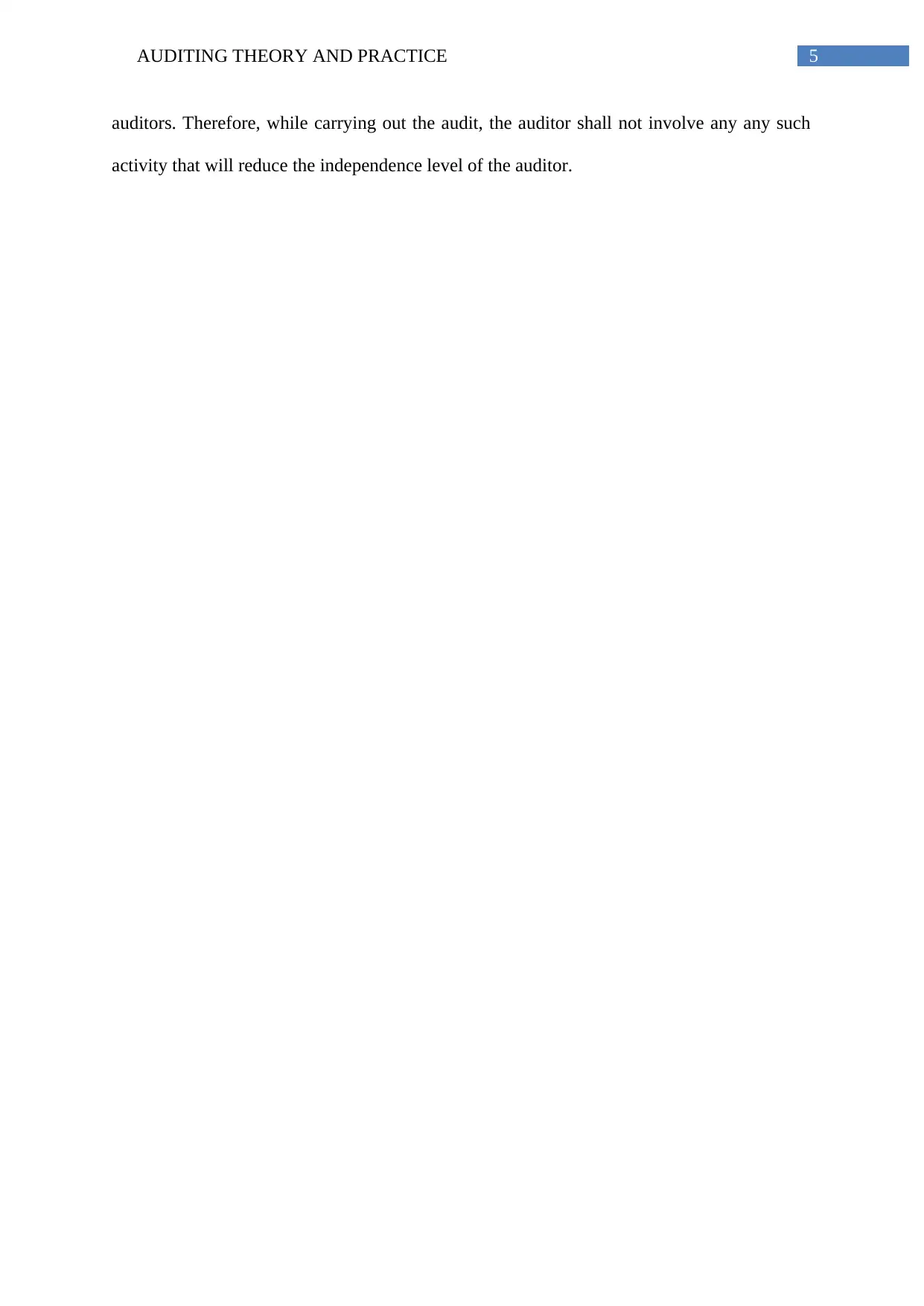
5AUDITING THEORY AND PRACTICE
auditors. Therefore, while carrying out the audit, the auditor shall not involve any any such
activity that will reduce the independence level of the auditor.
auditors. Therefore, while carrying out the audit, the auditor shall not involve any any such
activity that will reduce the independence level of the auditor.
⊘ This is a preview!⊘
Do you want full access?
Subscribe today to unlock all pages.

Trusted by 1+ million students worldwide
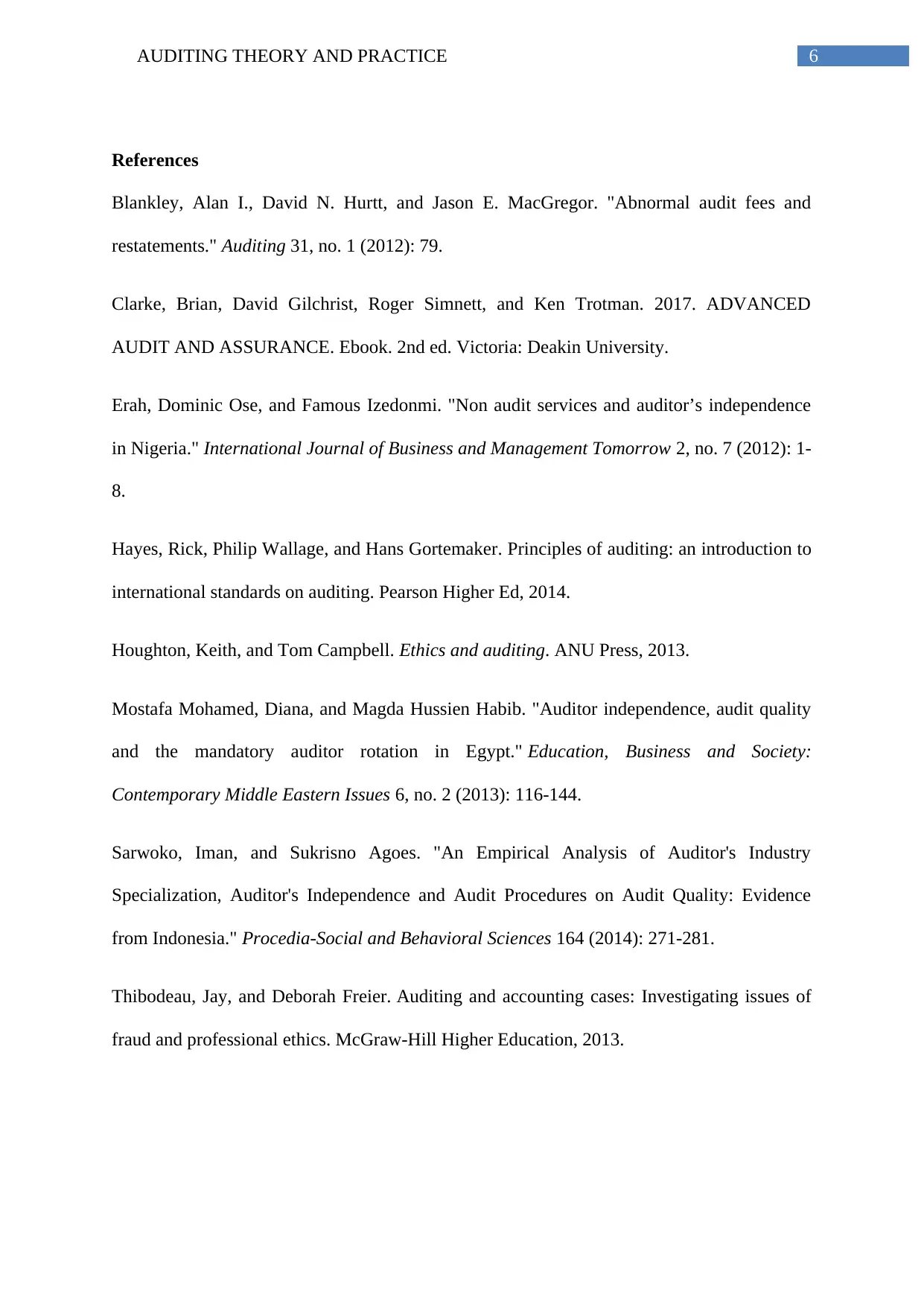
6AUDITING THEORY AND PRACTICE
References
Blankley, Alan I., David N. Hurtt, and Jason E. MacGregor. "Abnormal audit fees and
restatements." Auditing 31, no. 1 (2012): 79.
Clarke, Brian, David Gilchrist, Roger Simnett, and Ken Trotman. 2017. ADVANCED
AUDIT AND ASSURANCE. Ebook. 2nd ed. Victoria: Deakin University.
Erah, Dominic Ose, and Famous Izedonmi. "Non audit services and auditor’s independence
in Nigeria." International Journal of Business and Management Tomorrow 2, no. 7 (2012): 1-
8.
Hayes, Rick, Philip Wallage, and Hans Gortemaker. Principles of auditing: an introduction to
international standards on auditing. Pearson Higher Ed, 2014.
Houghton, Keith, and Tom Campbell. Ethics and auditing. ANU Press, 2013.
Mostafa Mohamed, Diana, and Magda Hussien Habib. "Auditor independence, audit quality
and the mandatory auditor rotation in Egypt." Education, Business and Society:
Contemporary Middle Eastern Issues 6, no. 2 (2013): 116-144.
Sarwoko, Iman, and Sukrisno Agoes. "An Empirical Analysis of Auditor's Industry
Specialization, Auditor's Independence and Audit Procedures on Audit Quality: Evidence
from Indonesia." Procedia-Social and Behavioral Sciences 164 (2014): 271-281.
Thibodeau, Jay, and Deborah Freier. Auditing and accounting cases: Investigating issues of
fraud and professional ethics. McGraw-Hill Higher Education, 2013.
References
Blankley, Alan I., David N. Hurtt, and Jason E. MacGregor. "Abnormal audit fees and
restatements." Auditing 31, no. 1 (2012): 79.
Clarke, Brian, David Gilchrist, Roger Simnett, and Ken Trotman. 2017. ADVANCED
AUDIT AND ASSURANCE. Ebook. 2nd ed. Victoria: Deakin University.
Erah, Dominic Ose, and Famous Izedonmi. "Non audit services and auditor’s independence
in Nigeria." International Journal of Business and Management Tomorrow 2, no. 7 (2012): 1-
8.
Hayes, Rick, Philip Wallage, and Hans Gortemaker. Principles of auditing: an introduction to
international standards on auditing. Pearson Higher Ed, 2014.
Houghton, Keith, and Tom Campbell. Ethics and auditing. ANU Press, 2013.
Mostafa Mohamed, Diana, and Magda Hussien Habib. "Auditor independence, audit quality
and the mandatory auditor rotation in Egypt." Education, Business and Society:
Contemporary Middle Eastern Issues 6, no. 2 (2013): 116-144.
Sarwoko, Iman, and Sukrisno Agoes. "An Empirical Analysis of Auditor's Industry
Specialization, Auditor's Independence and Audit Procedures on Audit Quality: Evidence
from Indonesia." Procedia-Social and Behavioral Sciences 164 (2014): 271-281.
Thibodeau, Jay, and Deborah Freier. Auditing and accounting cases: Investigating issues of
fraud and professional ethics. McGraw-Hill Higher Education, 2013.
1 out of 7
Related Documents
Your All-in-One AI-Powered Toolkit for Academic Success.
+13062052269
info@desklib.com
Available 24*7 on WhatsApp / Email
![[object Object]](/_next/static/media/star-bottom.7253800d.svg)
Unlock your academic potential
Copyright © 2020–2026 A2Z Services. All Rights Reserved. Developed and managed by ZUCOL.




